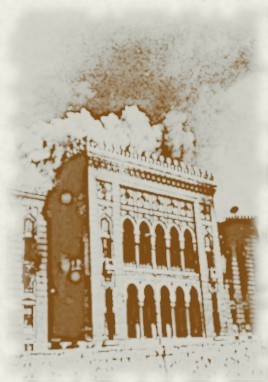


By comparing focused collections to the general patterns of academic libraries in the United States we can see the importance of determined efforts to collect on specific topics in response to world events. The Center for Bosnian Studies, which was the Bosnian Memory Project until just recently, is housed at Fontbonne University in St. Louis, the city with the largest population of refugees from Bosnia-Herzegovina in the country. The library responds to the disruptions of war and emigration with an effort to record this history as it is going on, and to recover items dispersed by the conflicts in the former Yugoslavia because this activity is important to the community and many of the students at Fontbonne in terms of their sense of identity and belonging. "The Center began as the Bosnia Memory Project in 2006 and was renamed the Center for Bosnian Studies to reflect its increasing role as a hub of knowledge and resources on Bosnia. Part of the College of Arts and Sciences at Fontbonne University, it preserves stories and artifacts from the Bosnian war and genocide, through an oral history project, special collections with many rare items, and a growing digital collections of unique resources on Bosnia and its diaspora."1 Their holdings include a collection of propaganda distributed during the Bosnian War. Few libraries in the world have items like this, according to WorldCat. A search of the Yale library system brought up only a few books that have any connection to this topic.
One of the things that happened after the Bosnian War was that systematic destruction of cultural heritage became more firmly defined as a war crime by the international community. Though it is a small issue in their general list of interests, the Human Rights Archive at Duke University again shows that libraries concern themselves with the issues of protecting international culture when it fits as a specific issue within their defined mission. In line with their material on the abuses of the wars in Yugoslavia, the library contains a small number of items on the destruction and genocide that occurred in Sarajevo, with a few videos and articles on the fate of the libraries, much more than most American collections.
András Riedlmayer, a cataloger at the Fine Arts Library at Harvard, studied the architecture of the Ottoman Empire in his native Hungary before moving to Harvard. In response to the destruction of the Sarajevo libraries in 1992, Riedlmayer set about immediately contacting scholars who might have notes or photocopies of the material they had researched in Yugoslavia. Notices soon followed on international listservs for scholars and librarians. As the war continued and more cultural destruction followed it, he travelled to the region multiple times to try to document the loss of cultural heritage and call for punishment for the perpatrators. Riedlmayer eventually produced official reports and toured with a slideshow to show the world what had happened to culture in the region. His personal collection, housed at the fine arts library, contains over eighteen archival boxes of what he has managed to put together. Even though this is best collection in the world on what was lost in Bosnia, Kosovo, and the rest of what had been Yugoslavia, few actual manuscripts or even texts could be recovered in this process.2 The collection illustrates two things for us here. There is a huge difference between the general support of American special collections for the cultural heritage of the world and the libraries that fix on specific topics as connected to their academic mission to serve their users, as they define them. The other lesson of his work is just how difficult it really is to respond to libricide with any plan to rebuild collections. Even in cases that only involve contemporary publications, history has shown repeatedly that destruction means destruction. For unique or rare materials housed in special collections, the world as it is has few mechanisms in place to protect them, and no effective use of the moral authority of American libraries to orchestrate any forces of preservation or punishment for special collections. The weak responses to the destruction of books by major institutions on Twitter reflects this situation.
